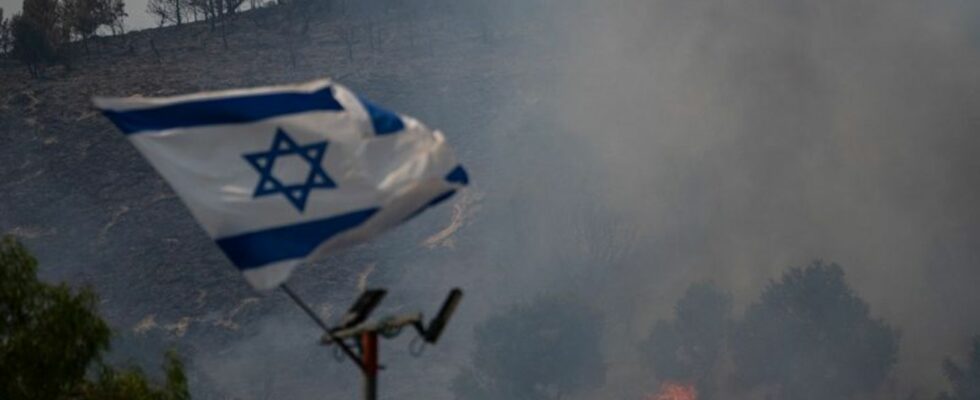War in the Middle East
Israel’s army warns of greater escalation
The Israeli flag flies on the border with Lebanon: Israel warns against an escalation of the conflict with Hezbollah in this area. Photo
© Leo Correa/AP/dpa
The conflict between Israel and the Hezbollah militia has been escalating for some time. Israel’s military is warning of an even greater escalation in the region. The news at a glance.
Israel’s military warns of a dangerous Expansion of the conflict with the Shiite militia Hezbollah in the border area with Lebanon. Army spokesman Daniel Hagari accused the militia in a video statement of increasing the attacks and thus endangering the future of their own country.
“Hezbollah’s increasing aggression could bring us to the brink of a major escalation that could have devastating consequences for Lebanon and the entire region.” The UN observer mission UNIFIL, which has been monitoring the border area between Israel and Lebanon since 1978, had previously expressed extreme concern about the increasing tensions.
Since the beginning of the Gaza war more than eight months ago, the situation has worsened significantly, and there are now almost daily clashes between the Israeli army and Hezbollah. The militia, supported by Israel’s arch-enemy Iran, is allied with the Islamist Hamas in the Gaza Strip, but is considered to be much more powerful.
Hezbollah recently stepped up its attacks after the Israeli military deliberately killed one of its commanders last week. The situation in southern Lebanon was “moving towards escalation,” Lebanese security sources said at the time.
“Protective shield” for Hamas
Hagari accused Hezbollah of trying to make Lebanon a shield for the terrorist organization Hamas. Israel will not allow the events of October 7 to be repeated on any of the country’s borders, the spokesman said, alluding to the devastating terrorist attack by Hamas and other groups on southern Israel last year.
In the massacre, 1,200 people were killed and another 250 were taken hostage to the Gaza Strip. According to figures from the Hamas-controlled health authorities – which cannot be independently verified – more than 37,000 Palestinians were killed in the war that was triggered by the massacre. Around 80 percent of the population has fled within the sealed-off coastal strip.
Israel will take the necessary measures to protect its citizens “until security is restored along our border with Lebanon,” Hagari said. According to a report in the Israeli newspaper Maariv, the armed forces later stressed that Hagari’s words did not represent a threat. Rather, they were intended as a message to the international community.
Risk of miscalculations
There is a “very real danger” that even a miscalculation could lead to a wide-ranging conflict, warned the head of the UN peacekeeping force in Lebanon, Aroldo Lázaro, and the special coordinator for the country, Jeanine Hennis-Plasschaert, in a joint statement. “We will continue to be in contact with the parties and call on all actors to lay down their arms in order to work towards a political and diplomatic solution.” This is the only solution with a lasting chance of success.
Limited ceasefire in southern Gaza
Hagari’s warning came after the Israeli military announced a limited ceasefire lasting several hours in the southern Gaza Strip. The “tactical pause” along an important road is intended to allow more aid deliveries to the coastal area. The decision was reportedly made after consultations with the United Nations and international organizations.
The pause applies along a road that leads from the Kerem Shalom border crossing to the northeast, but does not apply to the city of Rafah on the Egyptian border, the military stressed – fighting is set to continue there. The border crossing there, which was the most important gateway for aid deliveries until Israel’s military advance in Rafah, remains closed. Because of the many deaths and the catastrophic humanitarian situation, Israel’s actions in the Gaza war are highly controversial internationally.
Tight supply situation
Cogat, the Israeli agency responsible for Palestinian affairs, said on Sunday that more than 1,000 trucks carrying humanitarian aid were waiting to be picked up from the Gaza side of the Kerem Shalom border crossing. During the day, only 92 vehicles were picked up by UN aid organizations.
Due to the fighting between Israel’s army and Hamas, the World Food Programme (WFP) recently warned of a further deterioration in the supply situation for people in the southern Gaza Strip. According to the programme, they could soon suffer from the same catastrophic hunger situation as people in the northern areas.

